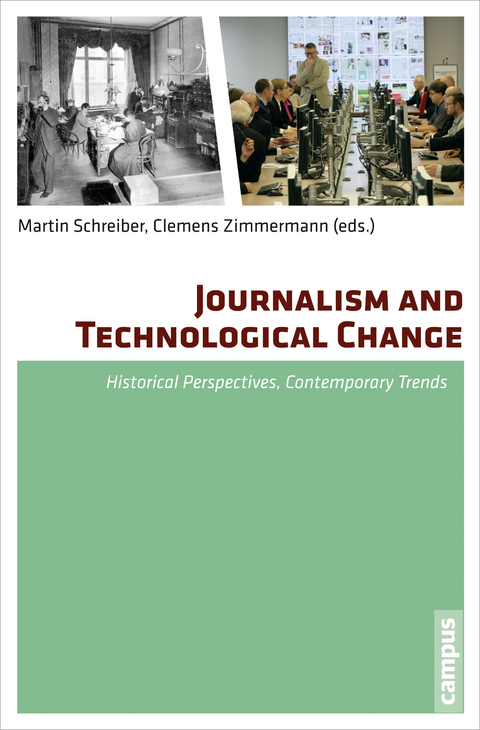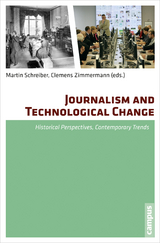Journalism and Technological Change
Clemens Zimmermann ist Professor für Kultur- und Mediengeschichte an der Universität des Saarlandes. Martin Schreiber ist dort wissenschaftlicher Mitarbeiter.
Contents
Preface 7
Introduction: Towards a New Perspective on Journalism and Technology 9
Clemens Zimmermann/Martin Schreiber
"Neither good, nor bad; nor neutral": The Historical Dispositif of Communication Technologies 30
Andreas Fickers
Temporalities of News: News and Speed from the Early Modern Era to the Present53
John Nerone
From Handmade to Technology-driven Journalism: Changes and Developments in Research, Writing, Editing, and Makeup 80
Jürgen Wilke
The Interpretive Turn in News 111
Kevin G. Barnhurst
Contemporary or Commercial? The Impact of Innovative Image Reproduction Techniques on the Imagery of Nineteenth Century Mass Media in Germany 142
Rita Gudermann
Eyewitnesses? The Visual Depiction of Events around 1900 165
Jens Jäger
Mobile, Networked and Digital Technology: Implications for Journalistic Work 185
John Pavlik
Journalistic Quality as Crowd Wisdom? What Journalists Think about Criticism on the Social Web 205
Tobias Eberwein
Quality in Journalism Reconsidered: The Limits of Realism225
Mitchell Stephens
User Participation and Professional Journalism on the Internet: Theoretical Background and Empirical Evidence244
Christoph Neuberger
Changing Technologies, Changing Journalistic Epistemologies: Public Participation, Emotionality and the Challenge to Objectivity264
Karin Wahl-Jorgensen
Notes on Contributors 284
Index 289
Introduction: Towards a New Perspective on Journalism and Technology
Clemens Zimmermann and Martin Schreiber
Technologies, media and journalism are closely interrelated. This is true for the present time as much as in historical perspective. Technologies such as telegraphy and the rotation press contributed to the multiplication and globalization of news and accelerated their distribution (Bösch 2011, 128-142). The piecemeal use of photography led to fundamentally new conjunctures of text and image and facilitated considerably expanded potentials for layout and new journalistic formats (Zimmermann and Schmeling 2006).
While countless representations of journalistic practices at present and in history largely ignore technological aspects and factors, a perspective on the 'impacts' of technologies is virtually impossible. It is thus necessary to take into account economic, social and cultural determinants of the history of usage of relevant technologies. Although the implementation of digital computer technology decisively changed the overall process of the production of media and especially journalistic practices over the last decades, the yet unanswered question is who used it, where it was used and for what motives. This volume hence approaches this complex from an interdisciplinary perspective and aims to contribute to its analyses of the manifold interplay between science and technology on the one hand and between society, culture and politics on the other.
These correlations imply that the causal relationship between technologies and their effects is distinguished, that both the production and sphere of consumption count in the history of applied technologies, and that not only continuities but also discontinuities should be observed in the implementation of technologies (Boczkowski and Lievrouw 2008). In this way, the volume ties in with the discussion of the social construction of technologies, which was directed against technological determinism. This discussion worked out that 'relevant social group' and 'interpretative flexibility' are among the key concepts of such an approach (Bijker 2008). In the German research context, the concept of 'appropriation' (Aneignung) was strengthened (though in relation to audience and not journalism research). Appropriation is to be understood as the complex historical process during the course of which new media and technologies are incorporated into standards of conduct, in which those perceptions and requirements of the users are adopted that are understood as acting subjects (Schmidt 1998).
1 The Current State of Research
In the history of media so far, the question of the technological implications of journalistic professional practice assumes in a positively striking way only a very limited significance. Neither for the 19th nor the 20th century have studies on the history of media paid even remotely sufficient attention to the question of technologies in the workplace and journalists' interaction with communications systems such as telegraph, telephone, teletypewriter and Internet. Research focuses on questions of political context, commercialization processes, cultural appropriation of American journalistic styles in Europe (investigative practices) and the political self-conceptions and dependencies of journalists (Zimmermann 2006; Hodenberg 2006). Media history has so far largely bypassed above all the massive economic and technological upheavals of the last decades, right up to today's medial applications (Agar 2005). However, general acceleration and globalization processes of medial communication were worked out and the nationally diversified parameters of journalistic practice repeatedly highlighted in the history of mass media (Barbier and Bertho Lavenir 2000; Requate 2010).
Within communications studies and journalism, on the other hand, which are open for the question of the actual impact
| Erscheint lt. Verlag | 18.6.2014 |
|---|---|
| Co-Autor | Amelia Bonea, Tobias Eberwein, Andreas Fickers, Rita Gudermann, Jens Jäger, John Nerone, Christoph Neuberger, John Pavlik, Martin Schreiber, Karin Wahl-Jorgensen, Jürgen Wilke, Clemens Zimmermann |
| Zusatzinfo | 28 sw- Abb |
| Verlagsort | Frankfurt |
| Sprache | englisch |
| Maße | 140 x 213 mm |
| Gewicht | 460 g |
| Themenwelt | Sozialwissenschaften ► Kommunikation / Medien ► Kommunikationswissenschaft |
| Sozialwissenschaften ► Kommunikation / Medien ► Medienwissenschaft | |
| Schlagworte | Amerika • Bildwissenschaft • Europa • Innovation,medientechnologische • Journalismus • Journalismusgeschichte • Medienforschung • Mediengeschichte • Südostasien • Techniksoziologie |
| ISBN-10 | 3-593-50104-X / 359350104X |
| ISBN-13 | 978-3-593-50104-8 / 9783593501048 |
| Zustand | Neuware |
| Haben Sie eine Frage zum Produkt? |
aus dem Bereich




